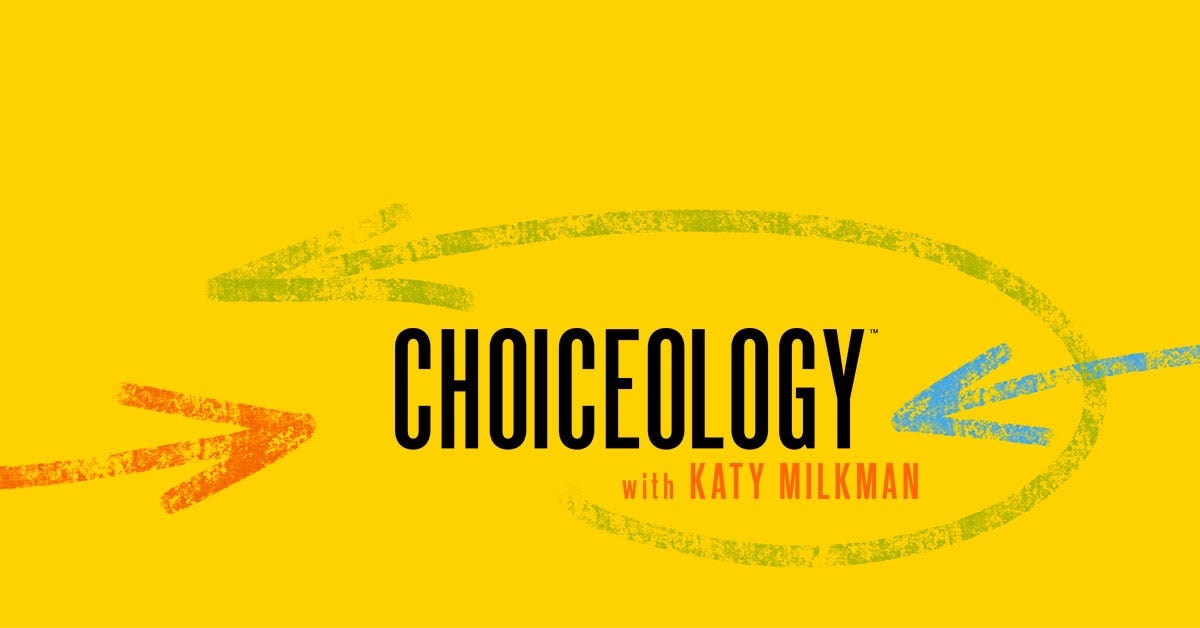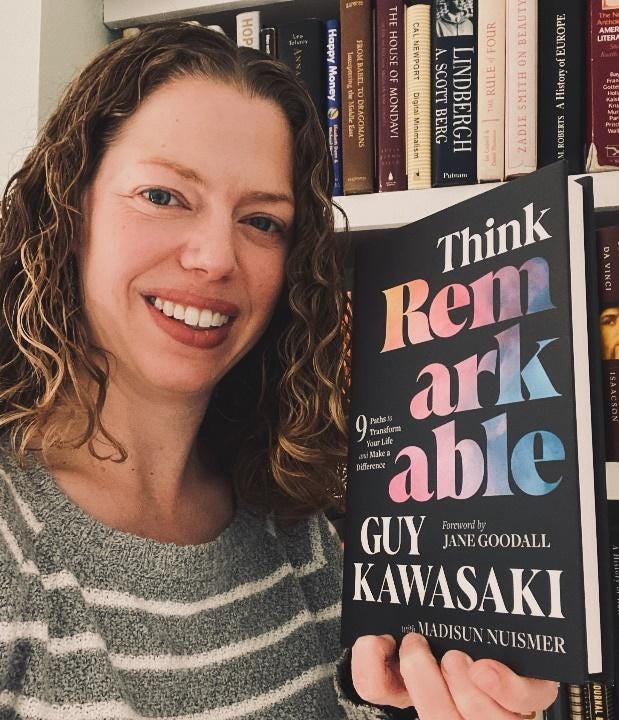What does it take to be remarkable?
Guy Kawasaki is on a journey to find out by interviewing some of the world’s most remarkable people.
An unexpected upside of writing How to Change was that my “book tour” introduced me to some really neat people who don’t run in my usual (wonderful but wonky) academic circles. I met a curious group of podcasters, journalists, and organizational leaders with a taste for behavioral science, and one new connection who particularly stood out was a charming surfer, author, podcast host and product evangelist named Guy Kawasaki. Best known for serving as Apple’s chief evangelist under Steve Jobs in the 80 and 90s, Guy is currently the chief evangelist at Canva. Although I typically use this newsletter to share Q&As with behavioral scientists who I’ve interviewed for Choiceology, I’m breaking that tradition to share a conversation with Guy that offers a peek into what he’s learned from weekly interviews with people who have had remarkable careers, like Apple co-founder Steve Wozniak and acclaimed psychologist Carol Dweck. I hope you’ll enjoy the conversation as much as I did!
This Month’s Recommended Listens and Reads
Learn How Repetition Biases Your Judgment: We’re baaack with a new season of Choiceology, and in our first episode, I interview UCL psychology Professor Tali Sharot about the illusory truth effect, which drives us to believe falsehoods when we hear them repeated.
Why You Should Make Time for Oddball Rituals: Inspired by HBS professor Mike Norton’s research on rituals’ power to improve our relationships, reduce our anxiety and increase our sense of control, this delightful New York Times article offers useful tips on how to build more rituals into your life.
Cultures of Growth: This wonderful new book by University of Indiana psychology professor Mary Murphy explains how leaders and organizations can create cultures that support growth mindsets instead of fixed mindsets. I highly recommend it and enjoyed snapping the below photo with the author (and our mutual friend/collaborator, Angela Duckworth) over a celebratory “book launch” lunch!
Q&A: Becoming Remarkable
In this Q&A, Canva’s chief evangelist Guy Kawasaki, shares what he’s learned about becoming remarkable from interviewing and befriending hundreds of truly exceptional people — from Jane Goodall to Stacey Abrams — and from a bit of introspection, too.
Me: Guy, this newsletter usually features an expert explaining a behavioral bias, some research on that bias and some tips for how to cure it. So I want to start by asking you about errors. Even extraordinary people make mistakes. Could you tell us about a mistake you made in your career and what you learned from it?
Guy: I left Apple in 1987. In about 1990, Steve offered me another job, and I turned him down. After finally going back, I left Apple again in 1997. Those three “mistakes” probably cost me tens of millions of dollars.
I learned many things from these mistakes. First, you should never bet against Steve Jobs. But more importantly, the grass is not always greener. Sometimes you should fertilize and water the grass you’re standing on.
Me: I love those takeaways. Okay, let’s flip things around and talk about tools you’ve noticed remarkable people using to make high quality decisions. What are some things that the superstars you interview seem to do differently than most people when they make choices?
Guy: What I observed about the people on my podcast and in my book is that they pursue interests. These interests come along by luck and happenstance more often than by intention. Then people scratch these itches and find themselves intrigued, challenged, and engaged.
Then comes years of toil and trouble. Mastery of their interests, I’ve come to find out, involves grit and eating what others may consider shit sandwiches. Nonetheless, they persevere where others would have given up. In other words, grit kicks in. Angela Duckworth is right.
Once you achieve success, you can look back and intellectualize your “right” decisions. But at the time, the decision making was probably the result of luck, desperation, and even a lack of alternatives. This yields a valuable lesson that I highlight at the end of the book. It has brought me great peace. Rather than focusing on making the right decision, you should do your best to make a reasonable decision and then focus on making your decision right.
The single, optimal “right” decision, is a delusion. And people think that making the right decision is the hard part, and implementation is easy. I’ve found the opposite to be true.
Take the data you have, get some opinions, then make a decision. Then pour your energy into making that decision right. This will yield a much higher percentage of successes.
Me: You’re a truly amazing supporter of other people and your enthusiasm is part of what makes you a great evangelist. Could you talk a bit about what draws you to advocate for others and share their successes and stories far and wide?
Guy: First, my father taught me that we were lucky, and so we have an obligation to help others. He called it noblesse oblige. I call it success oblige. That is, I believe that successful people — even if success is partly because of their hard work and brilliance and even more if that success is likely the result of luck and the help of others such as teachers, coaches, and mentors — should help others.
Second, there’s pattern recognition. I got lucky early in my career and helped people who weren’t rich, famous, powerful, and influential. I just helped them — often, because it was my job to help them. For example, it was my job to help Macintosh developers no matter how big or small. Over the years, these people who few thought would ever rise to the top, rose to the top. And God bless them, they remembered me and helped me back.
I saw this happen over and over, so at some point, I figured out that helping others was just a sound investment.
Third, I get great joy from helping others. I don’t know why. I just do. Call it a “giver’s high” if you like. Best drug ever.
Me: Jane Goodall is a personal hero of mine, and I know she’s both a hero and friend of yours (and the author of the foreword of your book). Could you share one or two of your favorite lessons learned from Jane?
Guy: This ties right back to the previous answer. Jane Goodall is several orders of magnitude more remarkable, important, and cool than me. And yet, she has always graciously and gracefully helped me whenever I asked her.
She set the standard for me. There are many times that I tell myself that if Jane Goodall can help you, then you can help a person. In fact, I believe I owe it to the karmic scoreboard in the sky to help others because Jane helped me.
Me: If you could leave our readers with just one key takeaway about how to be more remarkable, what would it be?
Guy: My key takeaway is this: don’t strive to be remarkable per se. Don’t hire a PR firm. Don’t hire an executive coach, ghostwriter, or speechwriter.
Being remarkable is not about positioning yourself. The way to be remarkable is to make a difference, to make the world a better place. You don’t have to be Steve Jobs or Jane Goodall. You could make the world a better place for one person, one stream, one team — it could even be for yourself.
But make a difference. Make the world a slightly better or way better place. Then people will come to the conclusion that you are remarkable all by themselves. This is how it works.
Damn, now your readers don’t need to buy my book…
Me: Actually, I think they need to buy it more than ever! Thanks, Guy. I really appreciate you taking the time away from your busy book tour to do this interview.
This interview has been edited for clarity and length.
To learn more about Guy’s insights from interviewing remarkable people, check out his book Think Remarkable or his podcast Remarkable People.
That’s all for this month’s newsletter. See you in April!
Katy Milkman, PhD
Professor at Wharton, Host of Choiceology, an original podcast from Charles Schwab, and Bestselling Author of How to Change
P.S. Join my community of ~100,000 followers on social media, where I shares ideas, research, and more: LinkedIn / Twitter / Instagram




